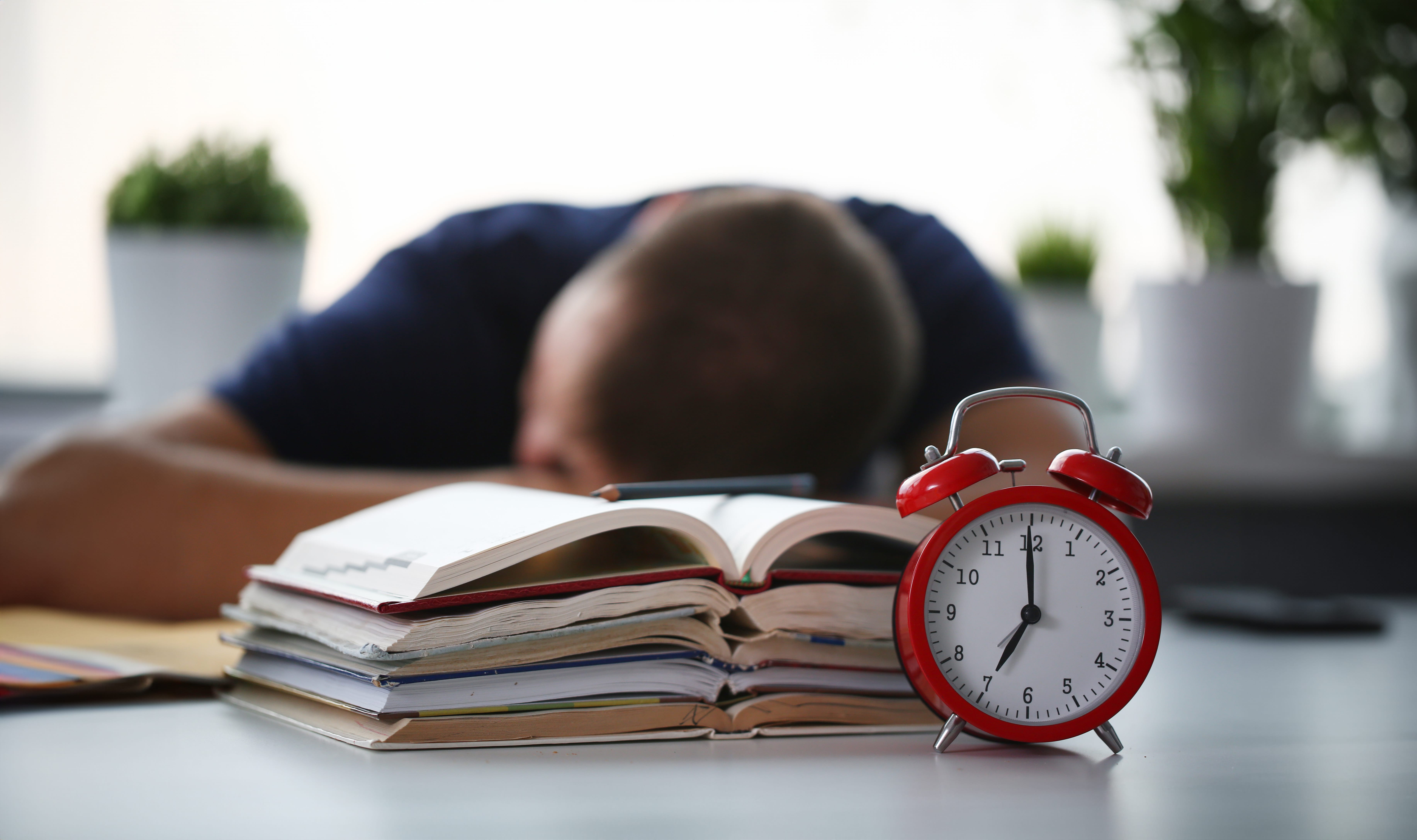Posted by Gemma Henry - Content Lead on 1st Jan 2020
Mastering Exam Sleep: Essential Tips for Optimal Rest
If it’s exam time for you, then you’ll know a thing or two about feeling stressed! During this time, you may well feel a little short tempered, tired and frankly unable to think about much else other than your revision.
One thing that can really help to keep stress levels low and make for exam success is getting a great night’s sleep. Getting enough sleep before taking GCSEs, A Levels or university exams is vital to ensure that your mind is active, and your brain is working well.
As exam season approaches, it's crucial to prioritise sleep for optimal performance. Quality sleep plays a significant role in memory consolidation, cognitive function, and overall well-being. To help you ace your exams, we've compiled essential tips to master your sleep routine.
The significance of sleep for exam performance

Sleep plays a pivotal role in our cognitive function , especially when it comes to exam performance ( 1). Understanding this connection is crucial for students who want to optimise their studying and achieve better results. Let's explore the significance of sleep for exam success.
Scientific research has consistently shown that sleep is essential for cognitive function. During sleep, our brains consolidate and organise information, helping us to retain and recall what we've learned. This process is particularly important for students who need to absorb vast amounts of information for their exams ( 2).
Unfortunately, lack of sleep can have a detrimental impact on academic performance ( 3). When we don't get enough sleep, our ability to concentrate, focus, and think critically is compromised. We may experience difficulties with memory recall, problem-solving, and creativity. All of these cognitive impairments can significantly hinder our exam performance.
Several studies have also established a direct link between sleep and exam success. Research has consistently shown that students who prioritise sleep tend to perform better in exams compared to those who sacrifice sleep for more study time. Quality sleep enhances our ability to learn, retain information, and think critically, ultimately leading to improved exam results ( 4).
At Bensons for Beds, we understand the importance of quality sleep for students. Our range of comfortable and supportive mattresses , pillows, and bedding can help create the ideal sleep environment to promote optimal cognitive function. Explore our products and prioritise sleep to maximise your exam performance.
Ideal sleep duration for students
Getting enough sleep is crucial for students as it directly impacts their academic performance and overall well-being. The recommended sleep duration for students varies depending on their age group. As a general guideline, teenagers between the ages of 14 and 17 should aim for 8 to 10 hours of sleep per night , while young adults aged 18 and above should aim for 7 to 9 hours .
Oversleeping and under-sleeping can have detrimental effects on students' ability to concentrate and retain information. When students oversleep, they may experience grogginess and find it difficult to focus during the day ( 5). On the other hand, under-sleeping (also known as sleep debt) can lead to fatigue, decreased cognitive function, and poor memory recall ( 6).
It's important for students to find a balance between their sleep and study schedules. Creating a consistent sleep routine can help regulate the body's internal clock and improve sleep quality. Establishing a regular bedtime and waking up at the same time every day, even on weekends, can help students get into a healthy sleep routine.
In addition, avoiding stimulants such as caffeine and electronic devices close to bedtime can promote better sleep. Creating a comfortable sleep environment with a supportive mattress and bedding can also contribute to a good night's sleep.
At Bensons for Beds, we understand the importance of quality sleep for students. Our range of mattresses and bedroom furniture can help create the perfect sleep environment, ensuring students get the rest they need to excel academically. Visit our website to explore our collection and find the ideal sleep solution for students.
Effective strategies for better sleep during exams

As exams approach, it is crucial to prioritise a good night's sleep to perform at your best. Sleep plays a vital role in cognitive function, memory consolidation, and overall well-being. To help you optimise your sleep during this stressful period, we have compiled some effective strategies:
1. Creating a conducive sleep environment
Start by ensuring your bedroom is a comfortable and relaxing space. Invest in a quality mattress and pillows from Bensons for Beds, providing optimal support for your body. Consider blackout curtains or an eye mask to block out any light disturbances that may disrupt your sleep. Keep the room at a cool temperature and minimise noise with earplugs or a white noise machine.
2. Establishing a regular sleep routine
Consistency is key when it comes to sleep. Establish a regular sleep schedule by going to bed and waking up at the same time every day, including weekends. This helps regulate your body's internal clock and promotes better sleep quality. Avoid stimulating activities close to bedtime, such as using electronic devices or consuming caffeine.
3. Relaxation techniques for better sleep
Prior to bedtime, engage in relaxation techniques to calm your mind and prepare your body for sleep. Try deep breathing exercises, progressive muscle relaxation, or guided meditation. You can also create a bedtime routine that includes reading a book, taking a warm bath, or listening to soothing music.
By implementing these strategies, you can create an optimal sleep environment, establish a consistent sleep routine, and incorporate relaxation techniques into your daily routine. Remember, a good night's sleep is essential for your exam success, and Bensons for Beds is here to support you with comfortable and supportive sleep products.
Common sleep disturbances and how to overcome them
From noise disruption and the increase in the hours of daylight to stress, anxiety, and beyond, there’s a lot of sleep disturbances you’ll need to consider during exam season. Understanding what’s disrupting your sleep is key to solving the problem.
Understanding common sleep disturbances among students
Student life can be demanding, especially during exam periods. The pressure to perform well can often lead to sleep disturbances. Common sleep disturbances among students include difficulty falling asleep, waking up frequently during the night, or experiencing restless sleep. These disruptions can have a negative impact on concentration, memory, and overall academic performance.
Practical tips to overcome sleep problems
Fortunately, there are practical steps you can take to improve your sleep quality. Establishing a consistent sleep schedule can help regulate your body's internal clock. Create a relaxing bedtime routine to signal to your brain that it's time to wind down. Avoid caffeine, electronic devices, and stimulating activities before bed. Ensure your sleep environment is comfortable, dark, and quiet. Invest in a quality mattress and pillows, like those offered by Bensons for Beds, to provide the necessary support for a restful night's sleep.
When to seek professional help

If your sleep problems persist despite implementing these tips, it may be beneficial to seek professional help. Your university or college may have a counselling service that can provide support for sleep-related issues. They can offer advice and strategies tailored to your specific situation. Additionally, a healthcare professional or sleep specialist can assess and diagnose any underlying sleep disorders that may be contributing to your sleep disturbances.
The role of diet and exercise in promoting sleep
Sleep quality can be greatly influenced by our daily diet and exercise routines . What we consume and how active we are during the day can directly impact our ability to fall asleep and stay asleep throughout the night. Here are some important factors to consider when it comes to diet and exercise for promoting better sleep:
How diet affects sleep quality
The foods we eat can either help or hinder our sleep. Consuming heavy, greasy, or spicy meals close to bedtime can lead to indigestion and discomfort, making it difficult to fall asleep. On the other hand, certain foods can actually promote better sleep. Foods rich in tryptophan, such as dairy products, nuts, and seeds, can help increase the production of serotonin and melatonin, which are hormones that regulate sleep ( 7).
Benefits of exercise for sleep
Regular exercise has been shown to improve sleep quality in numerous ways. Physical activity helps to reduce stress and anxiety, which are common culprits of insomnia. It also raises the body's core temperature, promoting deeper sleep. However, it is important to note that exercising too close to bedtime can have the opposite effect, as it can increase alertness and make it harder to wind down.
Recommended food and exercises before bedtime
To enhance your sleep routine, consider incorporating certain foods and exercises into your evening routine. Opt for a light snack that combines complex carbohydrates and protein, such as a small bowl of whole-grain cereal with milk or a turkey sandwich. These foods can help regulate blood sugar levels and promote better sleep. As for exercise, gentle stretching or relaxation exercises like yoga can help calm the mind and prepare the body for sleep.
Our top 10 exam sleep tips
Now that you understand what a vital role sleep plays in your exams, let’s look at our top 10 tips for getting enough sleep throughout exam season and beyond.
1. Avoid last minute cramming
Pulling an all-nighter the night before a big exam might seem like a good idea but try to step away from the coffee!
Things that are learned last minute often don’t stay in your head and there’s a reason for that. During sleep, memory consolidation takes place, which helps you to retain new information that you’ve learnt ( 8). If you stay up all night, you’ll miss this vital stage.
This means that you’ll be struggling to recall any information you’ve learned last minute when the exam paper is in front of you.
So leave the all-nighters for the next time you go clubbing!
2. Avoid blue light before bed

It’s tempting to scroll through your social media channels during your down time, after a tough day of revision. But did you know that the blue light that’s emitted through mobile phones, tablets and even the television can suppress the release of the sleeping hormone melatonin?
This can lead to trouble getting to sleep and disturbed sleep during the night ( 9).
Beat exam insomnia by switching off any devices at least 30 minutes before bedtime. If you can, remove them from the room too so you’re not tempted to scroll if you wake up during the night.
3. Wind down before bedtime
If you jump straight into bed once you’ve finished revising, you might find that your brain won’t switch off.
You might find yourself lying there reeling off pi to 10 places or going over Shakespeare quotes rather than getting some much needed shut eye.
Tell your brain it’s time to wind down and forget about your work (just for now!) by listening to relaxing music, reading a couple of chapters of your book or taking a warm bath. Light some scented candles to help set the mood for sleep.
4. Don’t fight your worries
It’s normal to feel anxious about exams. After all, it’s a stressful situation and there’s often a lot riding on them, such as university places for example. Stress isn’t always bad for you either. Often it can work to motivate you, helping you to overcome challenges ( 10)
Trying to battle against your worries will only make them worse so try to respond to them in a healthy, positive way. Welcome your thoughts or worries as they arrive and acknowledge them by saying them out loud.
Once you’ve said them, then consciously let them go. Imagine writing them down on a piece of paper, folding them up and then throwing them away. You could even keep a notebook by your bed and physically write down all your worries if you’d prefer.
This will help to keep you from tossing and turning with worry all night. If you are feeling stressed out, check out Louise Pentand’s top tips for looking after your mental health.
5. Stay in bed
If you wake up during the night, try to resist the urge to get up and start revising. Getting up will tire you out for the next day, making revision more difficult. It might also mean you get into a pattern of waking up at the same time each night.
If you can, do your revision somewhere other than your bedroom. You’re less likely to get up and wander through the house to your books if they’re in the living room or a home office, rather than your bedroom.
Stay in bed and save your valuable energy for the next day. Keeping a routine of going to bed at the same time and getting up at the same time each day will help you to get better sleep ( 11).
To help you get back to sleep, try some mindfulness and meditation. If you’re new to this, start off by trying to clear your mind by focussing on your body instead. Turn your attention to each part of your body, seeing if there is any tension there and trying to relax it.
If your mind wanders, bring your focus back to your body. If you think self-guided meditation might be a bit too much for you, there are plenty of apps available which can help you.
6. Don’t skip exercise

It can be tempting to think that you haven’t got time for anything else on revision days and exercise is usually the first thing to get scrapped from our to-do lists. However, exercise is so good for you and can provide some active time out in between cue cards and colour codes.
Try to exercise for at least 30 minutes each day in the run-up to an exam. Research shows that regular exercise can help you to sleep better at night time ( 12) It can help to improve both the depth and quality of the sleep you’re getting.
Exercise also helps to release endorphins which can help to lift your mood and ease those worries – something which is definitely needed at this time.
Find something that you love to do so that it doesn’t feel like a chore. This could be running, HIIT workouts, yoga or even just putting on your trainers and going for a walk.
However, be sure to limit your exercise to the morning or early afternoon and avoid exercising within two hours of bedtime. This is because the endorphins that exercise helps to release can make it more difficult for you to get to sleep.
7. Take regular breaks
Don’t underestimate the importance of taking a regular break from your revision. It’s tempting to power through, thinking that the more that you get done the better.
Getting your head down for long periods of time might seem like a good idea but overdoing it during the day can stop your brain from switching off at the end of the day.
Schedule a short five- or 10-minute break every hour to step away from your screen and do something completely different. Try listening to music, eating a snack, or going for a short walk.
Doing these activities, rather than being stuck in your books, helps to give you some head space. You’ll find that your productivity is boosted once you go back to your revision.
This will also help you to switch off at night and get the rest that you need.
8. Avoid midnight snacks
As well as sleep, your diet is important when it comes to your overall health and wellbeing, especially during exam time.
Try to avoid eating a big meal too close to bedtime as this can change your internal body clock and keep you awake longer. You also shouldn’t go to bed feeling hungry as these hunger pangs can stop you from getting to sleep – not to mention how hangry you’ll feel!
Eat your main meal before 7pm and, if you’re still hungry later on, have a small snack. Dried fruits, nuts, and popcorn can all be good options ( 13).
Be sure to drink plenty of water throughout the day too. Research has linked staying hydrated to a whole host of benefits for our brains including better concentration, enhanced short term memory, improved focus, and faster decision making ( 14).
The NHS recommends drinking around six to eight glasses of water each day. Just remember to go to the toilet before bed or you’ll be back up in the middle of the night ( 15)!
9. Make enough time for sleep
Often, we can end up going to bed too late and not leaving ourselves enough time to get a good night’s sleep. Most adults need between seven and nine hours sleep each night ( 16).
Count backwards from the time you need to get up to determine your bedtime and don’t forget to leave some time before this for your bedtime routine. We often forget to factor in time for brushing our teeth and our skincare routines.
10. Don’t worry about one night of bad sleep
Ever had that thing where you lie awake worrying that you need to get more sleep and then that makes it harder to get to sleep? Well, this is a vicious cycle which will have you tossing and turning all night long.
You can’t force yourself to sleep, so worrying about it won’t help. Although you might need more coffee than usual the next day, one night of bad sleep won’t hurt so try to free your mind of the worry you’re feeling about sleeping.
You’ve got enough to think about without sleep coming into it as well!
Sources:
- https://www.ncbi.nlm.nih.gov/pmc/articles/PMC5831725/
- https://www.ncbi.nlm.nih.gov/pmc/articles/PMC10155483/
- https://scholar.dominican.edu/cgi/viewcontent.cgi?article=1029&context=nursing-senior-theses
- https://www.ncbi.nlm.nih.gov/pmc/articles/PMC7946303/
- https://www.webmd.com/sleep-disorders/physical-side-effects-oversleeping
- https://www.nhlbi.nih.gov/health/sleep-deprivation
- https://www.ncbi.nlm.nih.gov/pmc/articles/PMC2908021/
- https://healthysleep.med.harvard.edu/healthy/matt...
- https://www.sleepfoundation.org/bedroom-environme...
- https://www.summahealth.org/flourish/entries/2021...
- https://www.verywellhealth.com/30-days-to-better-...
- https://www.hopkinsmedicine.org/health/wellness-a...
- https://www.bbc.co.uk/food/articles/23_healthy_sn...
- https://www.buxtonwater.co.uk/articles/health-and...
- https://www.nhs.uk/live-well/eat-well/food-guidel...
- https://www.webmd.com/sleep-disorders/sleep-requi...


 ?t=1640002750",
"summary": "Dr Sophie Bostock explains why having a set routine will not only help us work effectively but sleep better, too."
},
{
"title": "Katie Piper's Top 10 Tips for Sleeping Well",
"url": "https://www.bensonsforbeds.co.uk/sleep-hub/how-to-wake-up-in-a-good-place-katie-pipers-top-10-tips-for-sleeping-well/",
"thumbnail": "
?t=1640002750",
"summary": "Dr Sophie Bostock explains why having a set routine will not only help us work effectively but sleep better, too."
},
{
"title": "Katie Piper's Top 10 Tips for Sleeping Well",
"url": "https://www.bensonsforbeds.co.uk/sleep-hub/how-to-wake-up-in-a-good-place-katie-pipers-top-10-tips-for-sleeping-well/",
"thumbnail": "
 ?t=1637746372",
"summary": "Struggling to switch off? Here, Katie Piper shares her top 10 tips to help you sleep well..."
},
{
"title": "How Sleeping Well Could Help You Find Love",
"url": "https://www.bensonsforbeds.co.uk/sleep-hub/how-sleeping-well-could-help-you-find-love-sleep-hub/",
"thumbnail": "
?t=1637746372",
"summary": "Struggling to switch off? Here, Katie Piper shares her top 10 tips to help you sleep well..."
},
{
"title": "How Sleeping Well Could Help You Find Love",
"url": "https://www.bensonsforbeds.co.uk/sleep-hub/how-sleeping-well-could-help-you-find-love-sleep-hub/",
"thumbnail": "
 ",
"summary": "Looking to boost your dating profile? Bensons’ sleep expert Dr Sophie Bostock explains why getting enough sleep will help you do just that."
}
]
}
",
"summary": "Looking to boost your dating profile? Bensons’ sleep expert Dr Sophie Bostock explains why getting enough sleep will help you do just that."
}
]
}


